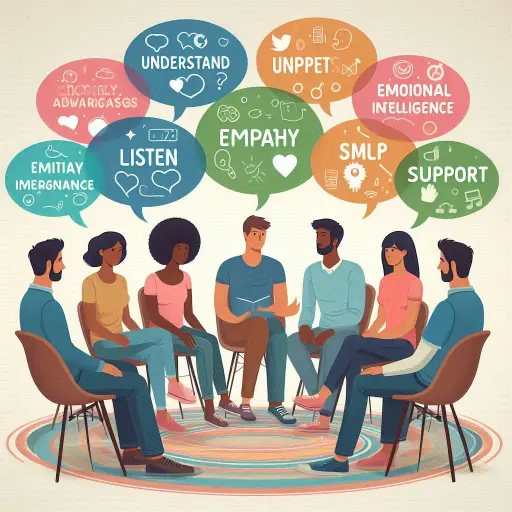EQ - Leaders and Emotional Intelligence: the Path to Effective Coaching
Az Üzletben a vezetői szerepek betöltése során egyre nagyobb hangsúlyt kap az EQ, azaz az érzelmi intelligencia, amely alapvetően befolyásolja a vezetők hatékonyságát és a szervezeti sikert. Az érzelmi intelligencia, vagyis az érzelmek megértésének, kezelésének és felhasználásának képessége, kritikus tényező a vezetési stílus és a munkahelyi légkör alakításában. A CoachLab Coaching Services Hungary kiemelt figyelmet fordít arra, hogy vezetői coaching programjaiban a vezetők érzelmi intelligenciájának fejlesztésére összpontosítson, mivel ez közvetlenül hozzájárul a hatékonyabb csapatmunkához, jobb döntéshozatalhoz és erősebb munkahelyi kapcsolatok kialakításához.
Az (EQ) Érzelmi Intelligencia Öt Alapvető Komponense
Daniel Goleman pszichológus, aki az érzelmi intelligencia koncepcióját népszerűsítette, öt kulcsfontosságú területet azonosított, amelyek meghatározzák ezt a képességet:
- Önismeret: A saját érzelmek felismerése és azok hatásának megértése önmagunkra és döntéseinkre.
- Önszabályozás: Az érzelmek kontrollálása és a késztetések kezelése helyzetek hatékony kezelése érdekében.
- Motivation: A belső motivációk és célok tisztázása, amelyek előreviszik a vezetőt és csapatát.
- Empátia: Mások érzéseinek, véleményének és szükségleteinek érzékeny és figyelmes észlelése.
- Szociális készségek: E készségek lehetővé teszik a hatékony kommunikációt, konfliktuskezelést és erőteljes kapcsolatépítést.
A Coaching Szerepe az EQ-ban, az Érzelmi Intelligencia Fejlesztésében
A CoachLab coaching programjai során a coachok az érzelmi intelligencia minden aspektusát célzottan fejlesztik. A coaching folyamat során a vezetők megismerhetik saját érzelmi reakcióikat, és megtanulhatják, hogyan szabályozzák azokat a szervezet érdekében. Az önismeret és önszabályozás fejlesztése által a vezetők képessé válnak arra, hogy stresszes helyzetekben is megőrizzék nyugalmukat és hatékonyan kommunikáljanak, így minimalizálva a konfliktusokat és növelve a csapat teljesítményét.
A motiváció és az empátia fejlesztése kiemelt terület a vezetői coachingban. A vezetők megtanulják, hogyan inspirálhatják és motiválhatják csapataikat, valamint hogyan teremthetnek mélyebb, értékelő kapcsolatokat munkatársaikkal. A szociális készségek fejlesztése révén pedig képesek lesznek a hatékony csapatmunka előmozdítására és a hálózatépítésre.
Az Érzelmi Intelligencia Gyakorlati Előnyei a Vezetésben
Az érzelmi intelligencia nem csupán elméleti fogalom, hanem gyakorlati eszköz is, amely jelentős előnyöket nyújthat a vezetők számára. A magas érzelmi intelligenciájú vezetők jobban kezelik a változásokat, eredményesebben oldanak meg problémákat és hatékonyabban kommunikálnak. Ezek a képességek közvetlenül hozzájárulnak a szervezeti célok eléréséhez, mivel a vezetők képesek adaptálni a stratégiáikat a változó üzleti környezethez.
Továbbá, az érzelmileg intelligens vezetők hitelesebbek és meggyőzőbbek, ami növeli a munkatársak elkötelezettségét és lojalitását. Egy ilyen vezető képes inspirálni csapatát, hogy magasabb teljesítményt nyújtsanak, és pozitív munkahelyi kultúrát alakítsanak ki, amely elősegíti az innovációt és a kreativitást.
Az EQ-val rendelkező vezetők
Az érzelmi intelligenciával rendelkező vezetők egyúttal jobban képesek felismerni és kezelni munkatársaik érzelmeket is, ami szintén hozzájárul a jobb munkahelyi légkör kialakításához. Ez a képesség különösen fontos a változáskezelés és a válsághelyzetek idején, amikor a munkatársak gyakran szoronganak vagy stresszesek. Ilyen körülmények között az érzelmi intelligencia lehet az a különbségtétel, amely segít a vezetőnek stabilizálni a csapatot és fenntartani a produktivitást.
The Executive Érzelmi készségek Fejlesztésének Módszerei a CoachLab's Gyakorlatában
A CoachLab coaching szolgáltatásai során számos speciálisan kidolgozott technikát alkalmazunk a vezetői érzelmi intelligencia fejlesztésére:
- Önreflexiós gyakorlatok: Ezek segítenek a vezetőknek mélyebb önismeretre szert tenni, felismerve saját érzelmeiket és azok hatását döntéseikre és vezetési stílusukra.
- Szerepjátékok és case studies: Ezek a módszerek lehetővé teszik a vezetők számára, hogy gyakorlati helyzetekben teszteljék és fejlesszék érzelmi reakcióikat, empátiás képességeiket és konfliktuskezelési technikáikat.
- Feedback kultúra építése: A rendszeres, konstruktív visszajelzések segítik a vezetőket abban, hogy tudatosítsák, milyen hatással vannak másokra az érzelmi viselkedésükkel, és hogy hol van még fejlődni valójuk.
- Meditációs és relaxációs technikák: Ezek a módszerek segítenek a vezetőknek jobban kezelni a stresszt, ami közvetlenül javítja az önszabályozás képességét.
- Célorientált coaching ülések: Ezek az ülések segítenek a vezetőknek tisztázni személyes és szakmai céljaikat, ami növeli motivációjukat és segít jobban navigálni az érzelmi kihívások között.
The Érzelmi készségek és a Teljesítmény Közötti Összefüggés
Kutatások bizonyítják, hogy az érzelmi intelligencia magas szintje pozitívan korrelál a jobb munkateljesítménnyel. A vezetők, akik képesek kezelni saját és mások érzelmeit, gyakran hatékonyabbak a munkahelyi konfliktusok megoldásában, jobban tudják motiválni a csapatukat, és nagyobb mértékben képesek inspirálni az innovációt. Ezek a képességek nélkülözhetetlenek a mai gyorsan változó üzleti környezetben, ahol a rugalmasság és az alkalmazkodóképesség elengedhetetlen a sikerhez.
Hogyan Mérjük az Érzelmi Intelligencia Hatását?
A vezetők érzelmi érzékenységének fejlődését többféleképpen mérhetjük. A CoachLab különböző értékelési eszközöket használ, mint például 360 fokos értékelések, amelyek a kollégák és beosztottak visszajelzéseit is magukban foglalják. Ezenkívül, a szervezeti teljesítményindikátorok, mint a csapatmunka, az ügyfél-elégedettség és a munkatársi elkötelezettség szintjei is jelzik az érzelmi intelligencia fejlődésének hatásait.
Summary
A vezetői siker kulcsa ma már nem csupán a szakmai tudásban és döntéshozatali készségben rejlik, hanem egyre inkább az érzelmi intelligenciában is. A CoachLab Coaching Services Hungary elkötelezett amellett, hogy vezetői coaching programjaival támogassa a vezetők érzelmi intelligencia fejlesztését, mivel ez alapvetően befolyásolja a vezetési hatékonyságot és a szervezeti sikerességet. Az érzelmi intelligenciának köszönhetően a vezetők képesek lesznek kiaknázni teljes potenciáljukat, maximálisan támogatni csapataikat és hozzájárulni a szervezet hosszú távú sikereihez.
A témához kapcsolódó kérdések, melyeket gyakran feltesznek ügyfeleink
GYIK: Vezetői Képességek Fejlesztése
Hogyan javítható a döntéshozatali képesség?
A döntéshozatali képesség fejleszthető a kritikus gondolkodás és a problémamegoldó technikák gyakorlásával, valamint rendszeres visszajelzések és értékelések alapján.
Milyen módszerekkel lehet erősíteni a csapatmunkát?
A csapatmunka erősítése érdekében érdemes rendszeres team building tevékenységeket szervezni, nyílt kommunikációs csatornákat biztosítani, és közös célokat meghatározni a csapat számára.
Hogyan kezelhetők hatékonyan a munkahelyi konfliktusok?
A munkahelyi konfliktusok kezeléséhez fontos az objektív hallgatás, a konfliktus gyökereinek feltárása és a win-win megoldások keresése, amelyek mindkét fél számára elfogadhatóak.
Miként lehet fejleszteni a kommunikációs készségeket?
A kommunikációs készségek fejlesztésére több módszer is alkalmazható, többek között a nyilvános beszéd gyakorlása, az aktív hallgatás technikáinak elsajátítása és a nonverbális kommunikációs jelek tudatos használata.
Milyen stratégiák segíthetnek a vezetőknek a stressz kezelésében?
A stressz kezelésében hatékony stratégiák közé tartozik az időgazdálkodás, a relaxációs technikák rendszeres alkalmazása, mint a meditáció vagy a jóga, valamint a munka és magánélet egyensúlyának megteremtése.


